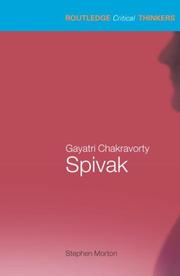| Listing 1 - 10 of 35 | << page >> |
Sort by
|
Book
ISBN: 9783869450728 386945072X Year: 2009 Publisher: Nordhausen Traugott Bautz
Abstract | Keywords | Export | Availability | Bookmark
 Loading...
Loading...Choose an application
- Reference Manager
- EndNote
- RefWorks (Direct export to RefWorks)

ISBN: 9780415229357 Year: 2003 Publisher: London ; New York : Routledge,
Abstract | Keywords | Export | Availability | Bookmark
 Loading...
Loading...Choose an application
- Reference Manager
- EndNote
- RefWorks (Direct export to RefWorks)
Gayatri Chakravorty Spivak offers an overtly political challenge to the way we think about literature and culture. As she highlights the many legacies of colonialism, she re-defines the ethical horizons of contemporary critical thought. This volume focuses on her key theoretical concepts, intellectual context and critical reception, providing an accessible introduction to one of the most important thinkers of our time.Stephen Morton introduces Spivak's crucial work through an analysis of such issues as:* methodology and Spivak's 'difficult' style* deconstructive strategies* third world women, the concept of the 'subaltern' and the critique of western feminism* re-reading Marx for the global capitalist era* Spivak's contribution to colonial discourse studies and postcolonial theory.Having examined the ways in which Spivak has transformed contemporary cultural theory, and in particular feminist and postcolonial thought, Morton concludes with a guide to reading Spivak's work and that of her critics. Essential for students of literature or cultural studies, this volume is the ideal companion for a first encounter with Spivak's remarkable texts.
Book
ISBN: 9791037031945 Year: 2023 Publisher: Paris : Hermann,
Abstract | Keywords | Export | Availability | Bookmark
 Loading...
Loading...Choose an application
- Reference Manager
- EndNote
- RefWorks (Direct export to RefWorks)
Comment être à la fois celle qui est professeure, directrice de recherche à l'université Columbia de New York et celle qui enseigne dans les écoles rurales en Inde, écoles qu'elle a fondées pour les enfants déshérités ?Gayatri Chakravorty Spivak ne prétend pas se mettre « à la place » ; depuis sa place, avec du recul tout en restant dans une « walking distance », une distance humaine, franchissable, avec sa différence, ses expériences propres, elle se joint.Elle donne cours à la controverse des langues, fait entendre les « subalternes », se réclame des axiomes de Derrida : l'accueil inconditionnel, une « politique de l'amitié ». Elle n'a pas peur du foisonnement, de la mobilité, de la caducité, pas peur du décentrement. Elle prône la dé-hiérarchisation politique, linguistique, culturelle, refuse l'emprise du modèle capitalistique occidental.Nous sommes au fondement même des questionnements qui taraudent le monde aujourd'hui. Avec Gayatri Chakravorty Spivak se dessine la capacité de penser et d'acter, hors des catégories de l'humanisme traditionnel, une nouvelle sécularisation du politique.
Book
ISBN: 9780823233250 9780823233267 9780823233274 Year: 2011 Publisher: New York Fordham university press
Abstract | Keywords | Export | Availability | Bookmark
 Loading...
Loading...Choose an application
- Reference Manager
- EndNote
- RefWorks (Direct export to RefWorks)
Article
Abstract | Keywords | Export | Availability | Bookmark
 Loading...
Loading...Choose an application
- Reference Manager
- EndNote
- RefWorks (Direct export to RefWorks)
Book
ISBN: 9780198075561 Year: 2014 Publisher: New Delhi : Oxford University Press,
Abstract | Keywords | Export | Availability | Bookmark
 Loading...
Loading...Choose an application
- Reference Manager
- EndNote
- RefWorks (Direct export to RefWorks)
Analysing the range and the impact of Gayatri Chakavorty Spivak's approach to postcolonial studies, this book brings together the fields of conversations, questions, critiques, and subsequent responses by her regarding her influential work-A Critique of Postcolonial Reason: Toward a History of the Vanishing Present. Spivak's theories and methods have not only been used in the fields of cultural studies and philosophy of language, but have also been widely applied in the fields of anthropology and political studies. In this book, arguments on a range of subjects including feminist studies as well as the techniques of reading texts are brought forth by the contributors. They debate the implications of Spivak's theories in cultural studies, ethnography, and anthropology. The volume is a detailed guide to contemporary thought, and includes Gayatri Spivak's response to the issues and questions raised in the chapters by the contributors. While Purushottama Billimoria recounts the circumstances in which these thoughts came together, Dina Al-Kassim in her introduction to the volume contextualizes political movements and feminist thought.
Spivak, Gayatri Chakravorty --- Critique et interprétation.
Book
ISBN: 9781443874670 1443877778 9781443877770 Year: 2015 Publisher: Cambridge Scholars Publishing
Abstract | Keywords | Export | Availability | Bookmark
 Loading...
Loading...Choose an application
- Reference Manager
- EndNote
- RefWorks (Direct export to RefWorks)
How does Spivak approach the signs the madwoman in the attic, the good black servant, the monster and the “wholly Other”? What is the basis of Spivak’s ethics of interpretation and what are her main tools? Gayatri Spivak: Deconstruction and the Ethics of Postcolonial Literary Interpretation is an ambitious and compelling critical work which answers various questions surrounding one of the most notoriously difficult literary theorists in our times. This book is an in-depth study of Spivak’s readings of a cluster of canonical and peripheral literary texts covering Jane Eyre, Wide Sargasso Sea, Frankenstein, Foe and “Pterodactyl.” It divides Spivak’s literary theoretical practice into two phases; the first is de Manian and the second is Derridean. However, the book also shows that these two phases are not clearly independent from each other; rather, there are continuities between them. The theory resulting from these two phases can be described as affirmative postcolonial literary interpretation: Derridean in spirit but de Manian in technique. The book also meticulously defines Spivak’s position within the thought of Derrida, de Man and western feminists and reveals the possibilities available for readers who wish to ethically approach and interpret the sign of the “wholly Other,” which reaches in its scope “the native subaltern female.” Analysing Spivak’s literary interpretation as such, this book offers insights to postcolonial readers and provides them with new tools, such as “learning from below,” useful for reading not literature only, but also contemporary political, cultural and social issues from new perspectives.
Littérature postcoloniale. --- Postcolonialisme --- Spivak, Gayatri Chakravorty, --- Critique et interprétation

ISBN: 0826463185 0826463193 9786612013980 147254563X 128201398X 1441106537 Year: 2006 Publisher: London Continuum
Abstract | Keywords | Export | Availability | Bookmark
 Loading...
Loading...Choose an application
- Reference Manager
- EndNote
- RefWorks (Direct export to RefWorks)
Culture. --- Feminist theory. --- Spivak, Gayatri Chakravorty. --- Political philosophy. Social philosophy --- Philosophical anthropology --- Sociology of the family. Sociology of sexuality --- Spivak, Gayatri Chakravorty --- Feminism --- Marxism --- Theory --- Book --- Deconstruction
Book
ISBN: 2354802099 9782354802097 Year: 2020 Publisher: Paris: Amsterdam,
Abstract | Keywords | Export | Availability | Bookmark
 Loading...
Loading...Choose an application
- Reference Manager
- EndNote
- RefWorks (Direct export to RefWorks)
La 4e de couverture indique : "Parce qu’elles ont contribué à dénoncer la domination de la pensée occidentale, les subaltern studies demeurent depuis les années 1980 une source intarissable de controverses. À cet égard, la réponse négative apportée au titre de cet ouvrage – "Les Subalternes peuvent-elles parler ?" – est riche d’enseignements. Prenant à contrepied l’eurocentrisme du récit occidental, Spivak nous montre qu’il est impossible d’analyser l’histoire de l’oppression des femmes sans prendre en compte les logiques impérialistes qui l’ont façonnée. Ce classique de la philosophie contemporaine s’attache à mettre en lumière le récit des dominés. Spivak expose la difficulté que rencontrent les subalternes à être considérées comme sujets de leurs propres actes. Ce petit livre, jalon de la réappropriation du passé colonial par les intellectuels du Sud, constitue une contribution majeure au renouvellement des sciences humaines."
Féminisme --- Identité de genre --- Colonialisme --- Postcolonialism --- Feminist theory --- Spivak, Gayatri Chakravorty. - Can the subaltern speak? --- Spivak, Gayatri Chakravorty --- Feminist theory. --- Marginality, Social --- Théorie féministe --- Postcolonialisme --- Exclusion sociale
Book
ISBN: 9780773414570 Year: 2010 Publisher: Lewiston Queenston Lampeter : Edwin Mellen Press,
Abstract | Keywords | Export | Availability | Bookmark
 Loading...
Loading...Choose an application
- Reference Manager
- EndNote
- RefWorks (Direct export to RefWorks)
Postcolonialism. --- Bhabha, homi k. (1949-....) --- Postcolonialisme --- Spivak, gayatri chakravorty (1942-....) --- Bhabha, Homi K., --- Said, Edward W. --- Spivak, Gayatri Chakravorty. --- Said, Edward Wadie
| Listing 1 - 10 of 35 | << page >> |
Sort by
|

 Search
Search Feedback
Feedback About UniCat
About UniCat  Help
Help News
News